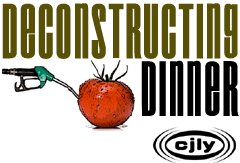
[Editor's note: This is a summary of a podcast you can download or listen to from this page.]
Launching this episode, we travel to Cuba, a country that has over the past 10 years become of increasing interest to those around the world interested in more ecological models of producing food.
Contrary to the more voluntary means through which some North Americans have adopted and supported more energy efficient and ecological food choices, in 1989, Cubans had little choice. As a result of the Soviet collapse, Cubans were plunged into a situation whereby conventional models of farming had to be abandoned for more organic models.
Deconstructing Dinner correspondent Andrea Langlois travelled to Cuba, where she met with Fernando Funes Monzoté -- the son of one of the most recognized founders of the Cuban organic agriculture movement -- Dr. Fernando Funes Sr. His son has followed in his footsteps and is presently completing his PhD on more diversified mixed farming systems at the University of Matanzas.
As the past 17 years has seen a regeneration of more biodiverse and ecological food production in Cuba, there has, in tandem, also been an increase in the attention paid to biological systems.
The second half of today's episode will introduce us to some of our smaller friends, who are becoming, and will continue to become, more important to the production of our food: insects. In March 2008, Deconstructing Dinner recorded a workshop titled "Predator, Pollinator, Parasite," hosted at the 2008 conference of the Certified Organic Associations of B.C.
Guests
Fernando Funes Monzoté, researcher, University of Matanzas (Matanzas, Cuba) -- Fernando Funes is the son of celebrated agricultural figure Dr. Fernando Funes Sr., whose organic farming association was awarded the Right Livelihood Award (otherwise known as the alternative Nobel) in 1999. Fernando Funes Monzoté graduated in 1995 from the University of Havana. Since then, he has worked in one of the research institutions in Cuba's Ministry of Agriculture, and after 13 years of research, is just about finished his PhD thesis at the University of Matanzas. His research is on mixed farming systems as part of the University's pasture and forage research institute.
Deborah Henderson, director, Institute for Sustainable Horticulture, Kwantlen University College (Surrey, B.C.) -- Deborah is dedicated to the potential for integrated efforts in conservation, biological pest control and sustainable landscaping. Dr. Henderson, along with Kwantlen University College's School of Horticulture and the Institute for Sustainable Horticulture, established a conservation biological control trial garden, or "bug garden," which will be a valuable resource, providing class materials and a living lab for students to practice horticulture activities and study plants, pests and beneficial insects, and the relationships between them.
Related Tyee stories:
- Food Ethics
Podcast: 'Deconstructing Dinner' on personal versus corporate responsibility. - The Co-op Alternative
Podcast: 'Deconstructing Dinner' looks at community farming in BC. - Social Fertilizer
The big growth potential of urban agriculture.
Read more: Podcasts, Travel, Food, Deconstructing Dinner















Tyee Commenting Guidelines
Comments that violate guidelines risk being deleted, and violations may result in a temporary or permanent user ban. Maintain the spirit of good conversation to stay in the discussion.
*Please note The Tyee is not a forum for spreading misinformation about COVID-19, denying its existence or minimizing its risk to public health.
Do:
Do not: